Yi Jing Hexagram 52 - Line 4
The hexagram: 52
An hexagram is a combination of six yin and yang lines.

52.4 (52 > 56) - THE KĂN HEXAGRAM.
The fourth line, divided, shows its subject keeping his trunk at rest. There will be no error.
Bing DeepL Google Yandex52.4 (52 > 56) - Kán, l’arrêt
Kán : ferme, tenir droit, bien réglé, arrêter, reposer
Tenir le corps droit et ferme, c’est une bonne manière. [On doit tenir le corps entier tout droit.] (Répétition du § 3 pour en avoir six. Tenir le corps droit est un principe essentiel des rites chinois.)
Bing DeepL Google YandexThe trigrams
The trigrams are combinations of three yin and yang lines. The three bottom lines of the hexagram form the lower trigram and represent the inner situation. The three top lines form the upper trigram and represent the outer situation.
trigSup2


trigInf

The nuclear hexagram: 40.3.5 (40 > 28)
The nuclear hexagram is the association of the two inner trigrams (lines 2,3,4 and 3,4,5). It represents the root, or the origin of the situation.

40.3.5 (40 > 28) - THE KIEH HEXAGRAM.
- 3. The third line, divided, shows a porter with his burden, (yet) riding in a carriage. He will (only) tempt robbers to attack him. However firm and correct he may (try to) be, there will be cause for regret.
- 5. The fifth line, divided, shows (its subject), the superior man ( = the ruler), executing his function of removing (whatever is injurious to the idea of the hexagram), in which case there will be good fortune, and confidence in him will be shown even by the small men.
40.3.5 (40 > 28) - Making the dead speak
One can make others say what one wants when they are absent.
Bing DeepL Google Yandex40.3.5 (40 > 28) - Making the dead speak
One can make others say what one wants when they are absent.
Bing DeepL Google Yandex40.3.5 (40 > 28) - Kieh, la libération
Kieh : 1. Délivrer, faire échapper, échapper au danger ; 2. Disperser ; 3. Ouvrir, séparer, s’ouvrir. Se dit du mouvement de la germination. 4. Résoudre une difficulté, une complication.
-
3. Si un porteur se met dans un char et qu’il survienne des voleurs, il sera attaqué et échappera difficilement ; s’il abandonne sa charge, il pourra se sauver.
Pour un porteur, aller en char est honteux ; c’est attirer sur soi les voleurs.
Il n’appartient pas à des gens du commun d’aller en char . - 5. C’est au sage d’écarter (les maux) et de résoudre (les difficultés) ; s’il y réussit, il gagnera la confiance du vulgaire.
40.3.5 (40 > 28) - Faire parler les morts
On peut faire dire aux autres ce qu'on veut quand ils sont absents.
Bing DeepL Google Yandex40.3.5 (40 > 28) - Módosítás
- 3. Ha valaki elhanyagolja, másoknak adja.
- 5. Csak egy alkalmas személy tudja megmutatni a megoldást.
The derived (Fan Yao)
The same line number on the mutated hexagram. It reperesents what can be done AFTER to correct the situation described by this line, as a sort of remedy or solution.

56.4 (56 > 52) - THE LÜ HEXAGRAM.
The fourth line, undivided, shows the traveller in a resting-place, having (also) the means of livelihood and the axe, (but still saying), ‘I am not at ease I in my mind.’
Bing DeepL Google Yandex56.4 (56 > 52) - Losing legitimacy
When one defends oneself from others, one sees that things are not going well.
Bing DeepL Google Yandex56.4 (56 > 52) - Losing legitimacy
When one defends oneself from others, one sees that things are not going well.
Bing DeepL Google Yandex56.4 (56 > 52) - Lu, le voyageur
Lu : voyageur, hôte, étranger, loger ; bon arrangement.
Il peut s’être établi quelque part, y avoir ses biens et sa hache, mais son cœur n’est point encore à l’aise et en sûreté. (Il n’a point une situation assurée, il doit veiller.)
Bing DeepL Google Yandex56.4 (56 > 52) - Perdre sa légitimité
En se défendant des autres, on voit que ça ne va pas.
Bing DeepL Google YandexThe juncture: 55.3
The derived of the reciprocal. It represents what could have been done BEFORE to prevent the situation described by this line, as a sort of remedy or solution.

55.3 (55 > 51) - THE FĂNG HEXAGRAM.
The third line, undivided, shows its subject with an (additional) screen of a large and thick banner, through which at midday he can see (the small) Mei star. (In the darkness) he breaks his right arm ; but there will be no error.
Bing DeepL Google Yandex55.3 (55 > 51) - Yielding to pressure
The weakest abstain because they don't want to bear any more.
Bing DeepL Google Yandex55.3 (55 > 51) - Yielding to pressure
The weakest abstain because they don't want to bear any more.
Bing DeepL Google Yandex55.3 (55 > 51) - Fâng, l’abondance
Fâng : 1. Abondance, richesse, grand nombre d’amis ; 2. Avoir en abondance, multiplier ; 3. Grandeur, élévation.
En multipliant ses tentures, on peut (grâce à l’obscurité) voir l’étoile Mei (au Sagittaire) en plein jour, mais alors on se cassera le bras droit (il arrivera malheur).
Bing DeepL Google Yandex55.3 (55 > 51) - Céder sous la pression
Les plus faibles s'abstiennent car ils ne veulent pas en supporter davantage.
Bing DeepL Google Yandex55.3 (55 > 51) - Kezelni
A leggyengébb tartózkodik, mert nem akar többet vállalni.
Bing DeepL Google YandexThe reciprocal: 51.3
The hexagram upside down. It represents the opposite situation, and as such is insturmental when validating comments.

51.3 (51 > 55) - THE KĂN HEXAGRAM.
The third line, divided, shows its subject distraught amid the startling movements going on. If those movements excite him to (right) action, there will be no mistake.
Bing DeepL Google Yandex51.3 (51 > 55) - Kán, l’ébranlement
Kán : tonnerre, effroi répandu, crainte.
Le tonnerre émeut, agite ; il pousse à agir justement.
Bing DeepL Google YandexMutations

52.4 (52 > 56) - THE KĂN HEXAGRAM.
The fourth line, divided, shows its subject keeping his trunk at rest. There will be no error.
Bing DeepL Google Yandex52.4 (52 > 56) - Kán, l’arrêt
Kán : ferme, tenir droit, bien réglé, arrêter, reposer
Tenir le corps droit et ferme, c’est une bonne manière. [On doit tenir le corps entier tout droit.] (Répétition du § 3 pour en avoir six. Tenir le corps droit est un principe essentiel des rites chinois.)
Bing DeepL Google Yandex
52.1.4 (52 > 30) - THE KĂN HEXAGRAM.
- 1. The first line, divided, shows its subject keep- ing his toes at rest. There will be no error; but it will be advantageous for him to be persistently firm and correct.
- 4. The fourth line, divided, shows its subject keeping his trunk at rest. There will be no error.
52.1.4 (52 > 30) - Stop
One returns to one's allies to ask them if they want to continue the fight.
Bing DeepL Google Yandex52.1.4 (52 > 30) - Stop
One returns to one's allies to ask them if they want to continue the fight.
Bing DeepL Google Yandex52.1.4 (52 > 30) - Kán, l’arrêt
Kán : ferme, tenir droit, bien réglé, arrêter, reposer
-
1. (On doit) tenir fermes ses pieds ; i. e. être toujours d’une ferme droiture.
Ne jamais perdre sa droiture. - 4. Tenir le corps droit et ferme, c’est une bonne manière. [On doit tenir le corps entier tout droit.] (Répétition du § 3 pour en avoir six. Tenir le corps droit est un principe essentiel des rites chinois.)
52.1.4 (52 > 30) - Cesser
On retourne vers ses alliés pour leur demander si ils veulent poursuivre la lutte.
Bing DeepL Google Yandex52.1.4 (52 > 30) - Megállás
- 1. Nem megy megnézni mit tesznek a többiek hogy kerülje a bajokat.
- 4. Megáll, de mások folytatják.

52.2.4 (52 > 50) - THE KĂN HEXAGRAM.
- 2. The second line, divided, shows its subject keeping the calves of his legs at rest. He cannot help (the subject of the line above) whom he follows, and is dissatisfied in his mind.
- 4. The fourth line, divided, shows its subject keeping his trunk at rest. There will be no error.
52.2.4 (52 > 50) - Stop
One avoids making special efforts even though this is a recognised personality.
Bing DeepL Google Yandex52.2.4 (52 > 50) - Stop
One avoids making special efforts even though this is a recognized personality.
Bing DeepL Google Yandex52.2.4 (52 > 50) - Kán, l’arrêt
Kán : ferme, tenir droit, bien réglé, arrêter, reposer
-
2. « Arrêter le mouvement des jambes ». (Ou les tenir droites et bien posées.) Si, devant s’arrêter, on ne peut aider celui qui marche devant soi, on doit en avoir du déplaisir.
On doit aider et se rendre au cri d’appel. - 4. Tenir le corps droit et ferme, c’est une bonne manière. [On doit tenir le corps entier tout droit.] (Répétition du § 3 pour en avoir six. Tenir le corps droit est un principe essentiel des rites chinois.)
52.2.4 (52 > 50) - Cesser
On évite de faire des efforts particuliers bien qu'il s'agisse d'une personnalité que l'on a reconnue.
Bing DeepL Google Yandex52.2.4 (52 > 50) - Megállás
- 2. Ha a másik többet akar, nem tarthatja vissza.
- 4. Megáll, de mások folytatják.

52.1.2.4 (52 > 14) - THE KĂN HEXAGRAM.
- 1. The first line, divided, shows its subject keep- ing his toes at rest. There will be no error; but it will be advantageous for him to be persistently firm and correct.
- 2. The second line, divided, shows its subject keeping the calves of his legs at rest. He cannot help (the subject of the line above) whom he follows, and is dissatisfied in his mind.
- 4. The fourth line, divided, shows its subject keeping his trunk at rest. There will be no error.
52.1.2.4 (52 > 14) - Stop
One slows down those who get involved too quickly.
Bing DeepL Google Yandex52.1.2.4 (52 > 14) - Stop
One slows down those who get involved too quickly.
Bing DeepL Google Yandex52.1.2.4 (52 > 14) - Kán, l’arrêt
Kán : ferme, tenir droit, bien réglé, arrêter, reposer
-
1. (On doit) tenir fermes ses pieds ; i. e. être toujours d’une ferme droiture.
Ne jamais perdre sa droiture. -
2. « Arrêter le mouvement des jambes ». (Ou les tenir droites et bien posées.) Si, devant s’arrêter, on ne peut aider celui qui marche devant soi, on doit en avoir du déplaisir.
On doit aider et se rendre au cri d’appel. - 4. Tenir le corps droit et ferme, c’est une bonne manière. [On doit tenir le corps entier tout droit.] (Répétition du § 3 pour en avoir six. Tenir le corps droit est un principe essentiel des rites chinois.)
52.1.2.4 (52 > 14) - Megállás
- 1. Nem megy megnézni mit tesznek a többiek hogy kerülje a bajokat.
- 2. Ha a másik többet akar, nem tarthatja vissza.
- 4. Megáll, de mások folytatják.

52.3.4 (52 > 35) - THE KĂN HEXAGRAM.
- 3. The third line, undivided, shows its subject keeping his loins at rest, and separating the ribs (from the body below). The situation is perilous, and the heart glows with suppressed excitement.
- 4. The fourth line, divided, shows its subject keeping his trunk at rest. There will be no error.
52.3.4 (52 > 35) - Stop
One relies more on the kindness of others than on one's own merits.
Bing DeepL Google Yandex52.3.4 (52 > 35) - Stop
One relies more on the kindness of others than on one's own merits.
Bing DeepL Google Yandex52.3.4 (52 > 35) - Kán, l’arrêt
Kán : ferme, tenir droit, bien réglé, arrêter, reposer
- 3. Se tenir ferme à sa place et le corps (litt. : les côtes) bien tenu, (c’est ainsi que l’on doit être).
- 4. Tenir le corps droit et ferme, c’est une bonne manière. [On doit tenir le corps entier tout droit.] (Répétition du § 3 pour en avoir six. Tenir le corps droit est un principe essentiel des rites chinois.)
52.3.4 (52 > 35) - Cesser
On compte plus sur la bienveillance des autres que sur ses propres mérites.
Bing DeepL Google Yandex52.3.4 (52 > 35) - Megállás
- 3. A legalkalmasabbat kéri ha mások nem válaszolnak.
- 4. Megáll, de mások folytatják.

52.1.3.4 (52 > 21) - THE KĂN HEXAGRAM.
- 1. The first line, divided, shows its subject keep- ing his toes at rest. There will be no error; but it will be advantageous for him to be persistently firm and correct.
- 3. The third line, undivided, shows its subject keeping his loins at rest, and separating the ribs (from the body below). The situation is perilous, and the heart glows with suppressed excitement.
- 4. The fourth line, divided, shows its subject keeping his trunk at rest. There will be no error.
52.1.3.4 (52 > 21) - Stop
One listens to one's heart more than one's reason when it comes to protecting one's relatives.
Bing DeepL Google Yandex52.1.3.4 (52 > 21) - Stop
One listens to one's heart more than one's reason when it comes to protecting one's relatives.
Bing DeepL Google Yandex52.1.3.4 (52 > 21) - Kán, l’arrêt
Kán : ferme, tenir droit, bien réglé, arrêter, reposer
-
1. (On doit) tenir fermes ses pieds ; i. e. être toujours d’une ferme droiture.
Ne jamais perdre sa droiture. - 3. Se tenir ferme à sa place et le corps (litt. : les côtes) bien tenu, (c’est ainsi que l’on doit être).
- 4. Tenir le corps droit et ferme, c’est une bonne manière. [On doit tenir le corps entier tout droit.] (Répétition du § 3 pour en avoir six. Tenir le corps droit est un principe essentiel des rites chinois.)
52.1.3.4 (52 > 21) - Cesser
On écoute son cœur plus que sa raison quand il s'agit de protéger ses proches.
Bing DeepL Google Yandex52.1.3.4 (52 > 21) - Megállás
- 1. Nem megy megnézni mit tesznek a többiek hogy kerülje a bajokat.
- 3. A legalkalmasabbat kéri ha mások nem válaszolnak.
- 4. Megáll, de mások folytatják.

52.2.3.4 (52 > 64) - THE KĂN HEXAGRAM.
- 2. The second line, divided, shows its subject keeping the calves of his legs at rest. He cannot help (the subject of the line above) whom he follows, and is dissatisfied in his mind.
- 3. The third line, undivided, shows its subject keeping his loins at rest, and separating the ribs (from the body below). The situation is perilous, and the heart glows with suppressed excitement.
- 4. The fourth line, divided, shows its subject keeping his trunk at rest. There will be no error.
52.2.3.4 (52 > 64) - Stop
One senses that another solution would have been more advantageous.
Bing DeepL Google Yandex52.2.3.4 (52 > 64) - Stop
One senses that another solution would have been more advantageous.
Bing DeepL Google Yandex52.2.3.4 (52 > 64) - Kán, l’arrêt
Kán : ferme, tenir droit, bien réglé, arrêter, reposer
-
2. « Arrêter le mouvement des jambes ». (Ou les tenir droites et bien posées.) Si, devant s’arrêter, on ne peut aider celui qui marche devant soi, on doit en avoir du déplaisir.
On doit aider et se rendre au cri d’appel. - 3. Se tenir ferme à sa place et le corps (litt. : les côtes) bien tenu, (c’est ainsi que l’on doit être).
- 4. Tenir le corps droit et ferme, c’est une bonne manière. [On doit tenir le corps entier tout droit.] (Répétition du § 3 pour en avoir six. Tenir le corps droit est un principe essentiel des rites chinois.)
52.2.3.4 (52 > 64) - Cesser
On pressent qu'une autre solution aurait été plus avantageuse.
Bing DeepL Google Yandex52.2.3.4 (52 > 64) - Megállás
- 2. Ha a másik többet akar, nem tarthatja vissza.
- 3. A legalkalmasabbat kéri ha mások nem válaszolnak.
- 4. Megáll, de mások folytatják.

52.1.2.3.4 (52 > 38) - THE KĂN HEXAGRAM.
- 1. The first line, divided, shows its subject keep- ing his toes at rest. There will be no error; but it will be advantageous for him to be persistently firm and correct.
- 2. The second line, divided, shows its subject keeping the calves of his legs at rest. He cannot help (the subject of the line above) whom he follows, and is dissatisfied in his mind.
- 3. The third line, undivided, shows its subject keeping his loins at rest, and separating the ribs (from the body below). The situation is perilous, and the heart glows with suppressed excitement.
- 4. The fourth line, divided, shows its subject keeping his trunk at rest. There will be no error.
52.1.2.3.4 (52 > 38) - Stop
One tells others old jokes to fill the silence.
Bing DeepL Google Yandex52.1.2.3.4 (52 > 38) - Stop
One tells others old jokes to fill the silence.
Bing DeepL Google Yandex52.1.2.3.4 (52 > 38) - Kán, l’arrêt
Kán : ferme, tenir droit, bien réglé, arrêter, reposer
-
1. (On doit) tenir fermes ses pieds ; i. e. être toujours d’une ferme droiture.
Ne jamais perdre sa droiture. -
2. « Arrêter le mouvement des jambes ». (Ou les tenir droites et bien posées.) Si, devant s’arrêter, on ne peut aider celui qui marche devant soi, on doit en avoir du déplaisir.
On doit aider et se rendre au cri d’appel. - 3. Se tenir ferme à sa place et le corps (litt. : les côtes) bien tenu, (c’est ainsi que l’on doit être).
- 4. Tenir le corps droit et ferme, c’est une bonne manière. [On doit tenir le corps entier tout droit.] (Répétition du § 3 pour en avoir six. Tenir le corps droit est un principe essentiel des rites chinois.)
52.1.2.3.4 (52 > 38) - Cesser
On raconte aux autres des blagues éculées pour meubler le silence.
Bing DeepL Google Yandex52.1.2.3.4 (52 > 38) - Megállás
- 1. Nem megy megnézni mit tesznek a többiek hogy kerülje a bajokat.
- 2. Ha a másik többet akar, nem tarthatja vissza.
- 3. A legalkalmasabbat kéri ha mások nem válaszolnak.
- 4. Megáll, de mások folytatják.

52.4.5 (52 > 33) - THE KĂN HEXAGRAM.
- 4. The fourth line, divided, shows its subject keeping his trunk at rest. There will be no error.
- 5. The fifth line, divided, shows its subject keeping his jawbones at rest, so that his words are (all) orderly. Occasion for repentance will disappear.
52.4.5 (52 > 33) - Stop
One recovers faith after having been betrayed several times.
Bing DeepL Google Yandex52.4.5 (52 > 33) - Stop
One recovers faith after having been betrayed several times.
Bing DeepL Google Yandex52.4.5 (52 > 33) - Kán, l’arrêt
Kán : ferme, tenir droit, bien réglé, arrêter, reposer
- 4. Tenir le corps droit et ferme, c’est une bonne manière. [On doit tenir le corps entier tout droit.] (Répétition du § 3 pour en avoir six. Tenir le corps droit est un principe essentiel des rites chinois.)
-
5. Tenir ses mâchoires de sorte que les paroles sortent de la bouche avec ordre et mesure, cela exempte de repentir.
On sait ainsi conserver le milieu.
52.4.5 (52 > 33) - Cesser
On retrouve la foi après avoir été trahi à plusieurs reprises.
Bing DeepL Google Yandex52.4.5 (52 > 33) - Megállás
- 4. Megáll, de mások folytatják.
- 5. Nem fejti ki kételyeit hogy ne okozzon nehézségeket.

52.1.4.5 (52 > 13) - THE KĂN HEXAGRAM.
- 1. The first line, divided, shows its subject keep- ing his toes at rest. There will be no error; but it will be advantageous for him to be persistently firm and correct.
- 4. The fourth line, divided, shows its subject keeping his trunk at rest. There will be no error.
- 5. The fifth line, divided, shows its subject keeping his jawbones at rest, so that his words are (all) orderly. Occasion for repentance will disappear.
52.1.4.5 (52 > 13) - Stop
One is invested with a burden too heavy for one's skills.
Bing DeepL Google Yandex52.1.4.5 (52 > 13) - Stop
One is invested with a burden too heavy for one's skills.
Bing DeepL Google Yandex52.1.4.5 (52 > 13) - Kán, l’arrêt
Kán : ferme, tenir droit, bien réglé, arrêter, reposer
-
1. (On doit) tenir fermes ses pieds ; i. e. être toujours d’une ferme droiture.
Ne jamais perdre sa droiture. - 4. Tenir le corps droit et ferme, c’est une bonne manière. [On doit tenir le corps entier tout droit.] (Répétition du § 3 pour en avoir six. Tenir le corps droit est un principe essentiel des rites chinois.)
-
5. Tenir ses mâchoires de sorte que les paroles sortent de la bouche avec ordre et mesure, cela exempte de repentir.
On sait ainsi conserver le milieu.
52.1.4.5 (52 > 13) - Cesser
On est investi d'une charge trop lourde pour ses compétences.
Bing DeepL Google Yandex52.1.4.5 (52 > 13) - Megállás
- 1. Nem megy megnézni mit tesznek a többiek hogy kerülje a bajokat.
- 4. Megáll, de mások folytatják.
- 5. Nem fejti ki kételyeit hogy ne okozzon nehézségeket.

52.2.4.5 (52 > 44) - THE KĂN HEXAGRAM.
- 2. The second line, divided, shows its subject keeping the calves of his legs at rest. He cannot help (the subject of the line above) whom he follows, and is dissatisfied in his mind.
- 4. The fourth line, divided, shows its subject keeping his trunk at rest. There will be no error.
- 5. The fifth line, divided, shows its subject keeping his jawbones at rest, so that his words are (all) orderly. Occasion for repentance will disappear.
52.2.4.5 (52 > 44) - Kán, l’arrêt
Kán : ferme, tenir droit, bien réglé, arrêter, reposer
-
2. « Arrêter le mouvement des jambes ». (Ou les tenir droites et bien posées.) Si, devant s’arrêter, on ne peut aider celui qui marche devant soi, on doit en avoir du déplaisir.
On doit aider et se rendre au cri d’appel. - 4. Tenir le corps droit et ferme, c’est une bonne manière. [On doit tenir le corps entier tout droit.] (Répétition du § 3 pour en avoir six. Tenir le corps droit est un principe essentiel des rites chinois.)
-
5. Tenir ses mâchoires de sorte que les paroles sortent de la bouche avec ordre et mesure, cela exempte de repentir.
On sait ainsi conserver le milieu.
52.2.4.5 (52 > 44) - Megállás
- 2. Ha a másik többet akar, nem tarthatja vissza.
- 4. Megáll, de mások folytatják.
- 5. Nem fejti ki kételyeit hogy ne okozzon nehézségeket.

52.1.2.4.5 (52 > 1) - THE KĂN HEXAGRAM.
- 1. The first line, divided, shows its subject keep- ing his toes at rest. There will be no error; but it will be advantageous for him to be persistently firm and correct.
- 2. The second line, divided, shows its subject keeping the calves of his legs at rest. He cannot help (the subject of the line above) whom he follows, and is dissatisfied in his mind.
- 4. The fourth line, divided, shows its subject keeping his trunk at rest. There will be no error.
- 5. The fifth line, divided, shows its subject keeping his jawbones at rest, so that his words are (all) orderly. Occasion for repentance will disappear.
52.1.2.4.5 (52 > 1) - Stopping to be recognised
One wants others to notice the progress that one has made.
Bing DeepL Google Yandex52.1.2.4.5 (52 > 1) - Stopping to be recognized
One wants others to notice the progress that one has made.
Bing DeepL Google Yandex52.1.2.4.5 (52 > 1) - Kán, l’arrêt
Kán : ferme, tenir droit, bien réglé, arrêter, reposer
-
1. (On doit) tenir fermes ses pieds ; i. e. être toujours d’une ferme droiture.
Ne jamais perdre sa droiture. -
2. « Arrêter le mouvement des jambes ». (Ou les tenir droites et bien posées.) Si, devant s’arrêter, on ne peut aider celui qui marche devant soi, on doit en avoir du déplaisir.
On doit aider et se rendre au cri d’appel. - 4. Tenir le corps droit et ferme, c’est une bonne manière. [On doit tenir le corps entier tout droit.] (Répétition du § 3 pour en avoir six. Tenir le corps droit est un principe essentiel des rites chinois.)
-
5. Tenir ses mâchoires de sorte que les paroles sortent de la bouche avec ordre et mesure, cela exempte de repentir.
On sait ainsi conserver le milieu.
52.1.2.4.5 (52 > 1) - S'arrêter pour être reconnu
On veut que les autres remarquent les progrès que l'on a fait.
Bing DeepL Google Yandex52.1.2.4.5 (52 > 1) - Megállás
- 1. Nem megy megnézni mit tesznek a többiek hogy kerülje a bajokat.
- 2. Ha a másik többet akar, nem tarthatja vissza.
- 4. Megáll, de mások folytatják.
- 5. Nem fejti ki kételyeit hogy ne okozzon nehézségeket.

52.3.4.5 (52 > 12) - THE KĂN HEXAGRAM.
- 3. The third line, undivided, shows its subject keeping his loins at rest, and separating the ribs (from the body below). The situation is perilous, and the heart glows with suppressed excitement.
- 4. The fourth line, divided, shows its subject keeping his trunk at rest. There will be no error.
- 5. The fifth line, divided, shows its subject keeping his jawbones at rest, so that his words are (all) orderly. Occasion for repentance will disappear.
52.3.4.5 (52 > 12) - Stop
One takes the time to prepare before embarking on a risky business.
Bing DeepL Google Yandex52.3.4.5 (52 > 12) - Stop
One takes the time to prepare before embarking on a risky business.
Bing DeepL Google Yandex52.3.4.5 (52 > 12) - Kán, l’arrêt
Kán : ferme, tenir droit, bien réglé, arrêter, reposer
- 3. Se tenir ferme à sa place et le corps (litt. : les côtes) bien tenu, (c’est ainsi que l’on doit être).
- 4. Tenir le corps droit et ferme, c’est une bonne manière. [On doit tenir le corps entier tout droit.] (Répétition du § 3 pour en avoir six. Tenir le corps droit est un principe essentiel des rites chinois.)
-
5. Tenir ses mâchoires de sorte que les paroles sortent de la bouche avec ordre et mesure, cela exempte de repentir.
On sait ainsi conserver le milieu.
52.3.4.5 (52 > 12) - Cesser
On prend le temps de se préparer avant de se lancer dans une entreprise risquée.
Bing DeepL Google Yandex52.3.4.5 (52 > 12) - Megállás
- 3. A legalkalmasabbat kéri ha mások nem válaszolnak.
- 4. Megáll, de mások folytatják.
- 5. Nem fejti ki kételyeit hogy ne okozzon nehézségeket.

52.1.3.4.5 (52 > 25) - THE KĂN HEXAGRAM.
- 1. The first line, divided, shows its subject keep- ing his toes at rest. There will be no error; but it will be advantageous for him to be persistently firm and correct.
- 3. The third line, undivided, shows its subject keeping his loins at rest, and separating the ribs (from the body below). The situation is perilous, and the heart glows with suppressed excitement.
- 4. The fourth line, divided, shows its subject keeping his trunk at rest. There will be no error.
- 5. The fifth line, divided, shows its subject keeping his jawbones at rest, so that his words are (all) orderly. Occasion for repentance will disappear.
52.1.3.4.5 (52 > 25) - Stop
One gets butterflies in the stomach when one learns that the others have left.
Bing DeepL Google Yandex52.1.3.4.5 (52 > 25) - Stop
One gets butterflies in the stomach when one learns that the others have left.
Bing DeepL Google Yandex52.1.3.4.5 (52 > 25) - Kán, l’arrêt
Kán : ferme, tenir droit, bien réglé, arrêter, reposer
-
1. (On doit) tenir fermes ses pieds ; i. e. être toujours d’une ferme droiture.
Ne jamais perdre sa droiture. - 3. Se tenir ferme à sa place et le corps (litt. : les côtes) bien tenu, (c’est ainsi que l’on doit être).
- 4. Tenir le corps droit et ferme, c’est une bonne manière. [On doit tenir le corps entier tout droit.] (Répétition du § 3 pour en avoir six. Tenir le corps droit est un principe essentiel des rites chinois.)
-
5. Tenir ses mâchoires de sorte que les paroles sortent de la bouche avec ordre et mesure, cela exempte de repentir.
On sait ainsi conserver le milieu.
52.1.3.4.5 (52 > 25) - Cesser
On est tout chose quand on apprend que les autres sont partis.
Bing DeepL Google Yandex52.1.3.4.5 (52 > 25) - Megállás
- 1. Nem megy megnézni mit tesznek a többiek hogy kerülje a bajokat.
- 3. A legalkalmasabbat kéri ha mások nem válaszolnak.
- 4. Megáll, de mások folytatják.
- 5. Nem fejti ki kételyeit hogy ne okozzon nehézségeket.

52.2.3.4.5 (52 > 6) - THE KĂN HEXAGRAM.
- 2. The second line, divided, shows its subject keeping the calves of his legs at rest. He cannot help (the subject of the line above) whom he follows, and is dissatisfied in his mind.
- 3. The third line, undivided, shows its subject keeping his loins at rest, and separating the ribs (from the body below). The situation is perilous, and the heart glows with suppressed excitement.
- 4. The fourth line, divided, shows its subject keeping his trunk at rest. There will be no error.
- 5. The fifth line, divided, shows its subject keeping his jawbones at rest, so that his words are (all) orderly. Occasion for repentance will disappear.
52.2.3.4.5 (52 > 6) - Stop
One is going to be threatened if one keeps doing mistakes.
Bing DeepL Google Yandex52.2.3.4.5 (52 > 6) - Stop
One is going to be threatened if one keeps doing mistakes.
Bing DeepL Google Yandex52.2.3.4.5 (52 > 6) - Kán, l’arrêt
Kán : ferme, tenir droit, bien réglé, arrêter, reposer
-
2. « Arrêter le mouvement des jambes ». (Ou les tenir droites et bien posées.) Si, devant s’arrêter, on ne peut aider celui qui marche devant soi, on doit en avoir du déplaisir.
On doit aider et se rendre au cri d’appel. - 3. Se tenir ferme à sa place et le corps (litt. : les côtes) bien tenu, (c’est ainsi que l’on doit être).
- 4. Tenir le corps droit et ferme, c’est une bonne manière. [On doit tenir le corps entier tout droit.] (Répétition du § 3 pour en avoir six. Tenir le corps droit est un principe essentiel des rites chinois.)
-
5. Tenir ses mâchoires de sorte que les paroles sortent de la bouche avec ordre et mesure, cela exempte de repentir.
On sait ainsi conserver le milieu.
52.2.3.4.5 (52 > 6) - Cesser
On va être menacé si l'on continue de faire des bêtises.
Bing DeepL Google Yandex52.2.3.4.5 (52 > 6) - Megállás
- 2. Ha a másik többet akar, nem tarthatja vissza.
- 3. A legalkalmasabbat kéri ha mások nem válaszolnak.
- 4. Megáll, de mások folytatják.
- 5. Nem fejti ki kételyeit hogy ne okozzon nehézségeket.

52.1.2.3.4.5 (52 > 10) - THE KĂN HEXAGRAM.
- 1. The first line, divided, shows its subject keep- ing his toes at rest. There will be no error; but it will be advantageous for him to be persistently firm and correct.
- 2. The second line, divided, shows its subject keeping the calves of his legs at rest. He cannot help (the subject of the line above) whom he follows, and is dissatisfied in his mind.
- 3. The third line, undivided, shows its subject keeping his loins at rest, and separating the ribs (from the body below). The situation is perilous, and the heart glows with suppressed excitement.
- 4. The fourth line, divided, shows its subject keeping his trunk at rest. There will be no error.
- 5. The fifth line, divided, shows its subject keeping his jawbones at rest, so that his words are (all) orderly. Occasion for repentance will disappear.
52.1.2.3.4.5 (52 > 10) - Stop
One feels that the atmosphere has become heavier after having asked others to stop lying.
Bing DeepL Google Yandex52.1.2.3.4.5 (52 > 10) - Stop
One feels that the atmosphere has become heavier after having asked others to stop lying.
Bing DeepL Google Yandex52.1.2.3.4.5 (52 > 10) - Kán, l’arrêt
Kán : ferme, tenir droit, bien réglé, arrêter, reposer
-
1. (On doit) tenir fermes ses pieds ; i. e. être toujours d’une ferme droiture.
Ne jamais perdre sa droiture. -
2. « Arrêter le mouvement des jambes ». (Ou les tenir droites et bien posées.) Si, devant s’arrêter, on ne peut aider celui qui marche devant soi, on doit en avoir du déplaisir.
On doit aider et se rendre au cri d’appel. - 3. Se tenir ferme à sa place et le corps (litt. : les côtes) bien tenu, (c’est ainsi que l’on doit être).
- 4. Tenir le corps droit et ferme, c’est une bonne manière. [On doit tenir le corps entier tout droit.] (Répétition du § 3 pour en avoir six. Tenir le corps droit est un principe essentiel des rites chinois.)
-
5. Tenir ses mâchoires de sorte que les paroles sortent de la bouche avec ordre et mesure, cela exempte de repentir.
On sait ainsi conserver le milieu.
52.1.2.3.4.5 (52 > 10) - Cesser
On sent que l'atmosphère s'est alourdie après avoir demandé aux autres d'arrêter de mentir.
Bing DeepL Google Yandex52.1.2.3.4.5 (52 > 10) - Megállás
- 1. Nem megy megnézni mit tesznek a többiek hogy kerülje a bajokat.
- 2. Ha a másik többet akar, nem tarthatja vissza.
- 3. A legalkalmasabbat kéri ha mások nem válaszolnak.
- 4. Megáll, de mások folytatják.
- 5. Nem fejti ki kételyeit hogy ne okozzon nehézségeket.

52.4.6 (52 > 62) - THE KĂN HEXAGRAM.
- 4. The fourth line, divided, shows its subject keeping his trunk at rest. There will be no error.
- 6. The sixth line, undivided, shows its subject devotedly maintaining his restfulness. There will be good fortune.
52.4.6 (52 > 62) - Stop
One looks into the eyes of those who pass by chance.
Bing DeepL Google Yandex52.4.6 (52 > 62) - Stop
One looks into the eyes of those who pass by chance.
Bing DeepL Google Yandex52.4.6 (52 > 62) - Kán, l’arrêt
Kán : ferme, tenir droit, bien réglé, arrêter, reposer
- 4. Tenir le corps droit et ferme, c’est une bonne manière. [On doit tenir le corps entier tout droit.] (Répétition du § 3 pour en avoir six. Tenir le corps droit est un principe essentiel des rites chinois.)
-
6. Être tout appliqué à rester ferme dans le bien est une disposition très heureuse.
On peut ainsi être juste et droit jusqu’à la fin.
52.4.6 (52 > 62) - Cesser
On croise le regard de ceux qui passent par hasard.
Bing DeepL Google Yandex52.4.6 (52 > 62) - Megállás
- 4. Megáll, de mások folytatják.
- 6. Tanulmányozza környezete igényeit mielőtt foglalkozna azokkal.

52.1.4.6 (52 > 55) - THE KĂN HEXAGRAM.
- 1. The first line, divided, shows its subject keep- ing his toes at rest. There will be no error; but it will be advantageous for him to be persistently firm and correct.
- 4. The fourth line, divided, shows its subject keeping his trunk at rest. There will be no error.
- 6. The sixth line, undivided, shows its subject devotedly maintaining his restfulness. There will be good fortune.
52.1.4.6 (52 > 55) - Stop
One takes a nap until the others reach an agreement among themselves.
Bing DeepL Google Yandex52.1.4.6 (52 > 55) - Stop
One takes a nap until the others reach an agreement among themselves.
Bing DeepL Google Yandex52.1.4.6 (52 > 55) - Kán, l’arrêt
Kán : ferme, tenir droit, bien réglé, arrêter, reposer
-
1. (On doit) tenir fermes ses pieds ; i. e. être toujours d’une ferme droiture.
Ne jamais perdre sa droiture. - 4. Tenir le corps droit et ferme, c’est une bonne manière. [On doit tenir le corps entier tout droit.] (Répétition du § 3 pour en avoir six. Tenir le corps droit est un principe essentiel des rites chinois.)
-
6. Être tout appliqué à rester ferme dans le bien est une disposition très heureuse.
On peut ainsi être juste et droit jusqu’à la fin.
52.1.4.6 (52 > 55) - Cesser
On pique un somme le temps que les autres se mettent d'accord entre eux.
Bing DeepL Google Yandex52.1.4.6 (52 > 55) - Megállás
- 1. Nem megy megnézni mit tesznek a többiek hogy kerülje a bajokat.
- 4. Megáll, de mások folytatják.
- 6. Tanulmányozza környezete igényeit mielőtt foglalkozna azokkal.

52.2.4.6 (52 > 32) - THE KĂN HEXAGRAM.
- 2. The second line, divided, shows its subject keeping the calves of his legs at rest. He cannot help (the subject of the line above) whom he follows, and is dissatisfied in his mind.
- 4. The fourth line, divided, shows its subject keeping his trunk at rest. There will be no error.
- 6. The sixth line, undivided, shows its subject devotedly maintaining his restfulness. There will be good fortune.
52.2.4.6 (52 > 32) - Kán, l’arrêt
Kán : ferme, tenir droit, bien réglé, arrêter, reposer
-
2. « Arrêter le mouvement des jambes ». (Ou les tenir droites et bien posées.) Si, devant s’arrêter, on ne peut aider celui qui marche devant soi, on doit en avoir du déplaisir.
On doit aider et se rendre au cri d’appel. - 4. Tenir le corps droit et ferme, c’est une bonne manière. [On doit tenir le corps entier tout droit.] (Répétition du § 3 pour en avoir six. Tenir le corps droit est un principe essentiel des rites chinois.)
-
6. Être tout appliqué à rester ferme dans le bien est une disposition très heureuse.
On peut ainsi être juste et droit jusqu’à la fin.
52.2.4.6 (52 > 32) - Cesser
On récapitule avant de commencer une nouvelle leçon.
Bing DeepL Google Yandex52.2.4.6 (52 > 32) - Megállás
- 2. Ha a másik többet akar, nem tarthatja vissza.
- 4. Megáll, de mások folytatják.
- 6. Tanulmányozza környezete igényeit mielőtt foglalkozna azokkal.

52.1.2.4.6 (52 > 34) - THE KĂN HEXAGRAM.
- 1. The first line, divided, shows its subject keep- ing his toes at rest. There will be no error; but it will be advantageous for him to be persistently firm and correct.
- 2. The second line, divided, shows its subject keeping the calves of his legs at rest. He cannot help (the subject of the line above) whom he follows, and is dissatisfied in his mind.
- 4. The fourth line, divided, shows its subject keeping his trunk at rest. There will be no error.
- 6. The sixth line, undivided, shows its subject devotedly maintaining his restfulness. There will be good fortune.
52.1.2.4.6 (52 > 34) - Stop
One is absolutely sure that one has taken all the measures that others wanted.
Bing DeepL Google Yandex52.1.2.4.6 (52 > 34) - Stop
One is absolutely sure that one has taken all the measures that others wanted.
Bing DeepL Google Yandex52.1.2.4.6 (52 > 34) - Kán, l’arrêt
Kán : ferme, tenir droit, bien réglé, arrêter, reposer
-
1. (On doit) tenir fermes ses pieds ; i. e. être toujours d’une ferme droiture.
Ne jamais perdre sa droiture. -
2. « Arrêter le mouvement des jambes ». (Ou les tenir droites et bien posées.) Si, devant s’arrêter, on ne peut aider celui qui marche devant soi, on doit en avoir du déplaisir.
On doit aider et se rendre au cri d’appel. - 4. Tenir le corps droit et ferme, c’est une bonne manière. [On doit tenir le corps entier tout droit.] (Répétition du § 3 pour en avoir six. Tenir le corps droit est un principe essentiel des rites chinois.)
-
6. Être tout appliqué à rester ferme dans le bien est une disposition très heureuse.
On peut ainsi être juste et droit jusqu’à la fin.
52.1.2.4.6 (52 > 34) - Cesser
On est sûr et certain d'avoir pris toutes les mesures que les autres désiraient.
Bing DeepL Google Yandex52.1.2.4.6 (52 > 34) - Megállás
- 1. Nem megy megnézni mit tesznek a többiek hogy kerülje a bajokat.
- 2. Ha a másik többet akar, nem tarthatja vissza.
- 4. Megáll, de mások folytatják.
- 6. Tanulmányozza környezete igényeit mielőtt foglalkozna azokkal.
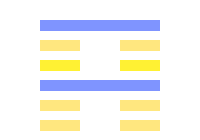
52.3.4.6 (52 > 16) - THE KĂN HEXAGRAM.
- 3. The third line, undivided, shows its subject keeping his loins at rest, and separating the ribs (from the body below). The situation is perilous, and the heart glows with suppressed excitement.
- 4. The fourth line, divided, shows its subject keeping his trunk at rest. There will be no error.
- 6. The sixth line, undivided, shows its subject devotedly maintaining his restfulness. There will be good fortune.
52.3.4.6 (52 > 16) - Stop
One supplements one's diet with appropriate ingredients.
Bing DeepL Google Yandex52.3.4.6 (52 > 16) - Stop
One supplements one's diet with appropriate ingredients.
Bing DeepL Google Yandex52.3.4.6 (52 > 16) - Kán, l’arrêt
Kán : ferme, tenir droit, bien réglé, arrêter, reposer
- 3. Se tenir ferme à sa place et le corps (litt. : les côtes) bien tenu, (c’est ainsi que l’on doit être).
- 4. Tenir le corps droit et ferme, c’est une bonne manière. [On doit tenir le corps entier tout droit.] (Répétition du § 3 pour en avoir six. Tenir le corps droit est un principe essentiel des rites chinois.)
-
6. Être tout appliqué à rester ferme dans le bien est une disposition très heureuse.
On peut ainsi être juste et droit jusqu’à la fin.
52.3.4.6 (52 > 16) - Cesser
On supplémente son régime avec des ingrédients appropriés.
Bing DeepL Google Yandex52.3.4.6 (52 > 16) - Megállás
- 3. A legalkalmasabbat kéri ha mások nem válaszolnak.
- 4. Megáll, de mások folytatják.
- 6. Tanulmányozza környezete igényeit mielőtt foglalkozna azokkal.
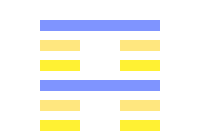
52.1.3.4.6 (52 > 51) - THE KĂN HEXAGRAM.
- 1. The first line, divided, shows its subject keep- ing his toes at rest. There will be no error; but it will be advantageous for him to be persistently firm and correct.
- 3. The third line, undivided, shows its subject keeping his loins at rest, and separating the ribs (from the body below). The situation is perilous, and the heart glows with suppressed excitement.
- 4. The fourth line, divided, shows its subject keeping his trunk at rest. There will be no error.
- 6. The sixth line, undivided, shows its subject devotedly maintaining his restfulness. There will be good fortune.
52.1.3.4.6 (52 > 51) - Stop
One abuses one's subordinates to make them move faster.
Bing DeepL Google Yandex52.1.3.4.6 (52 > 51) - Stop
One abuses one's subordinates to make them move faster.
Bing DeepL Google Yandex52.1.3.4.6 (52 > 51) - Kán, l’arrêt
Kán : ferme, tenir droit, bien réglé, arrêter, reposer
-
1. (On doit) tenir fermes ses pieds ; i. e. être toujours d’une ferme droiture.
Ne jamais perdre sa droiture. - 3. Se tenir ferme à sa place et le corps (litt. : les côtes) bien tenu, (c’est ainsi que l’on doit être).
- 4. Tenir le corps droit et ferme, c’est une bonne manière. [On doit tenir le corps entier tout droit.] (Répétition du § 3 pour en avoir six. Tenir le corps droit est un principe essentiel des rites chinois.)
-
6. Être tout appliqué à rester ferme dans le bien est une disposition très heureuse.
On peut ainsi être juste et droit jusqu’à la fin.
52.1.3.4.6 (52 > 51) - Cesser
On maltraite ses subalternes pour les faire avancer plus vite.
Bing DeepL Google Yandex52.1.3.4.6 (52 > 51) - Megállás
- 1. Nem megy megnézni mit tesznek a többiek hogy kerülje a bajokat.
- 3. A legalkalmasabbat kéri ha mások nem válaszolnak.
- 4. Megáll, de mások folytatják.
- 6. Tanulmányozza környezete igényeit mielőtt foglalkozna azokkal.
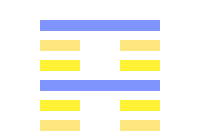
52.2.3.4.6 (52 > 40) - THE KĂN HEXAGRAM.
- 2. The second line, divided, shows its subject keeping the calves of his legs at rest. He cannot help (the subject of the line above) whom he follows, and is dissatisfied in his mind.
- 3. The third line, undivided, shows its subject keeping his loins at rest, and separating the ribs (from the body below). The situation is perilous, and the heart glows with suppressed excitement.
- 4. The fourth line, divided, shows its subject keeping his trunk at rest. There will be no error.
- 6. The sixth line, undivided, shows its subject devotedly maintaining his restfulness. There will be good fortune.
52.2.3.4.6 (52 > 40) - Stop
One gives consent with regrets so as not to sadden others.
Bing DeepL Google Yandex52.2.3.4.6 (52 > 40) - Stop
One gives consent with regrets so as not to sadden others.
Bing DeepL Google Yandex52.2.3.4.6 (52 > 40) - Kán, l’arrêt
Kán : ferme, tenir droit, bien réglé, arrêter, reposer
-
2. « Arrêter le mouvement des jambes ». (Ou les tenir droites et bien posées.) Si, devant s’arrêter, on ne peut aider celui qui marche devant soi, on doit en avoir du déplaisir.
On doit aider et se rendre au cri d’appel. - 3. Se tenir ferme à sa place et le corps (litt. : les côtes) bien tenu, (c’est ainsi que l’on doit être).
- 4. Tenir le corps droit et ferme, c’est une bonne manière. [On doit tenir le corps entier tout droit.] (Répétition du § 3 pour en avoir six. Tenir le corps droit est un principe essentiel des rites chinois.)
-
6. Être tout appliqué à rester ferme dans le bien est une disposition très heureuse.
On peut ainsi être juste et droit jusqu’à la fin.
52.2.3.4.6 (52 > 40) - Cesser
On donne son accord à regret pour ne pas faire de la peine aux autres.
Bing DeepL Google Yandex52.2.3.4.6 (52 > 40) - Megállás
- 2. Ha a másik többet akar, nem tarthatja vissza.
- 3. A legalkalmasabbat kéri ha mások nem válaszolnak.
- 4. Megáll, de mások folytatják.
- 6. Tanulmányozza környezete igényeit mielőtt foglalkozna azokkal.
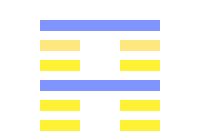
52.1.2.3.4.6 (52 > 54) - THE KĂN HEXAGRAM.
- 1. The first line, divided, shows its subject keep- ing his toes at rest. There will be no error; but it will be advantageous for him to be persistently firm and correct.
- 2. The second line, divided, shows its subject keeping the calves of his legs at rest. He cannot help (the subject of the line above) whom he follows, and is dissatisfied in his mind.
- 3. The third line, undivided, shows its subject keeping his loins at rest, and separating the ribs (from the body below). The situation is perilous, and the heart glows with suppressed excitement.
- 4. The fourth line, divided, shows its subject keeping his trunk at rest. There will be no error.
- 6. The sixth line, undivided, shows its subject devotedly maintaining his restfulness. There will be good fortune.
52.1.2.3.4.6 (52 > 54) - Stop
One does not weaken in order not to be seen failing.
Bing DeepL Google Yandex52.1.2.3.4.6 (52 > 54) - Stop
One does not weaken in order not to be seen failing.
Bing DeepL Google Yandex52.1.2.3.4.6 (52 > 54) - Kán, l’arrêt
Kán : ferme, tenir droit, bien réglé, arrêter, reposer
-
1. (On doit) tenir fermes ses pieds ; i. e. être toujours d’une ferme droiture.
Ne jamais perdre sa droiture. -
2. « Arrêter le mouvement des jambes ». (Ou les tenir droites et bien posées.) Si, devant s’arrêter, on ne peut aider celui qui marche devant soi, on doit en avoir du déplaisir.
On doit aider et se rendre au cri d’appel. - 3. Se tenir ferme à sa place et le corps (litt. : les côtes) bien tenu, (c’est ainsi que l’on doit être).
- 4. Tenir le corps droit et ferme, c’est une bonne manière. [On doit tenir le corps entier tout droit.] (Répétition du § 3 pour en avoir six. Tenir le corps droit est un principe essentiel des rites chinois.)
-
6. Être tout appliqué à rester ferme dans le bien est une disposition très heureuse.
On peut ainsi être juste et droit jusqu’à la fin.
52.1.2.3.4.6 (52 > 54) - Cesser
On ne faiblit pas pour ne pas se faire prendre en défaut.
Bing DeepL Google Yandex52.1.2.3.4.6 (52 > 54) - Megállás
- 1. Nem megy megnézni mit tesznek a többiek hogy kerülje a bajokat.
- 2. Ha a másik többet akar, nem tarthatja vissza.
- 3. A legalkalmasabbat kéri ha mások nem válaszolnak.
- 4. Megáll, de mások folytatják.
- 6. Tanulmányozza környezete igényeit mielőtt foglalkozna azokkal.

52.4.5.6 (52 > 31) - THE KĂN HEXAGRAM.
- 4. The fourth line, divided, shows its subject keeping his trunk at rest. There will be no error.
- 5. The fifth line, divided, shows its subject keeping his jawbones at rest, so that his words are (all) orderly. Occasion for repentance will disappear.
- 6. The sixth line, undivided, shows its subject devotedly maintaining his restfulness. There will be good fortune.
52.4.5.6 (52 > 31) - Stop
One finds a logical explanation to explain all this disorder.
Bing DeepL Google Yandex52.4.5.6 (52 > 31) - Stop
One finds a logical explanation to explain all this disorder.
Bing DeepL Google Yandex52.4.5.6 (52 > 31) - Kán, l’arrêt
Kán : ferme, tenir droit, bien réglé, arrêter, reposer
- 4. Tenir le corps droit et ferme, c’est une bonne manière. [On doit tenir le corps entier tout droit.] (Répétition du § 3 pour en avoir six. Tenir le corps droit est un principe essentiel des rites chinois.)
-
5. Tenir ses mâchoires de sorte que les paroles sortent de la bouche avec ordre et mesure, cela exempte de repentir.
On sait ainsi conserver le milieu. -
6. Être tout appliqué à rester ferme dans le bien est une disposition très heureuse.
On peut ainsi être juste et droit jusqu’à la fin.
52.4.5.6 (52 > 31) - Cesser
On trouve une explication logique pour expliquer tout ce désordre.
Bing DeepL Google Yandex52.4.5.6 (52 > 31) - Megállás
- 4. Megáll, de mások folytatják.
- 5. Nem fejti ki kételyeit hogy ne okozzon nehézségeket.
- 6. Tanulmányozza környezete igényeit mielőtt foglalkozna azokkal.

52.1.4.5.6 (52 > 49) - THE KĂN HEXAGRAM.
- 1. The first line, divided, shows its subject keep- ing his toes at rest. There will be no error; but it will be advantageous for him to be persistently firm and correct.
- 4. The fourth line, divided, shows its subject keeping his trunk at rest. There will be no error.
- 5. The fifth line, divided, shows its subject keeping his jawbones at rest, so that his words are (all) orderly. Occasion for repentance will disappear.
- 6. The sixth line, undivided, shows its subject devotedly maintaining his restfulness. There will be good fortune.
52.1.4.5.6 (52 > 49) - Stop
One compensates for one' s lack of success with flawless health practices.
Bing DeepL Google Yandex52.1.4.5.6 (52 > 49) - Stop
One compensates for one' s lack of success with flawless health practices.
Bing DeepL Google Yandex52.1.4.5.6 (52 > 49) - Kán, l’arrêt
Kán : ferme, tenir droit, bien réglé, arrêter, reposer
-
1. (On doit) tenir fermes ses pieds ; i. e. être toujours d’une ferme droiture.
Ne jamais perdre sa droiture. - 4. Tenir le corps droit et ferme, c’est une bonne manière. [On doit tenir le corps entier tout droit.] (Répétition du § 3 pour en avoir six. Tenir le corps droit est un principe essentiel des rites chinois.)
-
5. Tenir ses mâchoires de sorte que les paroles sortent de la bouche avec ordre et mesure, cela exempte de repentir.
On sait ainsi conserver le milieu. -
6. Être tout appliqué à rester ferme dans le bien est une disposition très heureuse.
On peut ainsi être juste et droit jusqu’à la fin.
52.1.4.5.6 (52 > 49) - Cesser
On compense son manque de réussite par une hygiène de vie sans faille.
Bing DeepL Google Yandex52.1.4.5.6 (52 > 49) - Megállás
- 1. Nem megy megnézni mit tesznek a többiek hogy kerülje a bajokat.
- 4. Megáll, de mások folytatják.
- 5. Nem fejti ki kételyeit hogy ne okozzon nehézségeket.
- 6. Tanulmányozza környezete igényeit mielőtt foglalkozna azokkal.

52.2.4.5.6 (52 > 28) - THE KĂN HEXAGRAM.
- 2. The second line, divided, shows its subject keeping the calves of his legs at rest. He cannot help (the subject of the line above) whom he follows, and is dissatisfied in his mind.
- 4. The fourth line, divided, shows its subject keeping his trunk at rest. There will be no error.
- 5. The fifth line, divided, shows its subject keeping his jawbones at rest, so that his words are (all) orderly. Occasion for repentance will disappear.
- 6. The sixth line, undivided, shows its subject devotedly maintaining his restfulness. There will be good fortune.
52.2.4.5.6 (52 > 28) - Stop
One updates one's data according to the new information one has received.
Bing DeepL Google Yandex52.2.4.5.6 (52 > 28) - Stop
One updates one's data according to the new information one has received.
Bing DeepL Google Yandex52.2.4.5.6 (52 > 28) - Kán, l’arrêt
Kán : ferme, tenir droit, bien réglé, arrêter, reposer
-
2. « Arrêter le mouvement des jambes ». (Ou les tenir droites et bien posées.) Si, devant s’arrêter, on ne peut aider celui qui marche devant soi, on doit en avoir du déplaisir.
On doit aider et se rendre au cri d’appel. - 4. Tenir le corps droit et ferme, c’est une bonne manière. [On doit tenir le corps entier tout droit.] (Répétition du § 3 pour en avoir six. Tenir le corps droit est un principe essentiel des rites chinois.)
-
5. Tenir ses mâchoires de sorte que les paroles sortent de la bouche avec ordre et mesure, cela exempte de repentir.
On sait ainsi conserver le milieu. -
6. Être tout appliqué à rester ferme dans le bien est une disposition très heureuse.
On peut ainsi être juste et droit jusqu’à la fin.
52.2.4.5.6 (52 > 28) - Cesser
On actualise ses données en fonction des nouvelles informations que l'on a reçues.
Bing DeepL Google Yandex52.2.4.5.6 (52 > 28) - Megállás
- 2. Ha a másik többet akar, nem tarthatja vissza.
- 4. Megáll, de mások folytatják.
- 5. Nem fejti ki kételyeit hogy ne okozzon nehézségeket.
- 6. Tanulmányozza környezete igényeit mielőtt foglalkozna azokkal.

52.1.2.4.5.6 (52 > 43) - THE KĂN HEXAGRAM.
- 1. The first line, divided, shows its subject keep- ing his toes at rest. There will be no error; but it will be advantageous for him to be persistently firm and correct.
- 2. The second line, divided, shows its subject keeping the calves of his legs at rest. He cannot help (the subject of the line above) whom he follows, and is dissatisfied in his mind.
- 4. The fourth line, divided, shows its subject keeping his trunk at rest. There will be no error.
- 5. The fifth line, divided, shows its subject keeping his jawbones at rest, so that his words are (all) orderly. Occasion for repentance will disappear.
- 6. The sixth line, undivided, shows its subject devotedly maintaining his restfulness. There will be good fortune.
52.1.2.4.5.6 (52 > 43) - Losing freshness
One finds something rotten in what should be impeccable.
Bing DeepL Google Yandex52.1.2.4.5.6 (52 > 43) - Losing freshness
One finds something rotten in what should be impeccable.
Bing DeepL Google Yandex52.1.2.4.5.6 (52 > 43) - Kán, l’arrêt
Kán : ferme, tenir droit, bien réglé, arrêter, reposer
-
1. (On doit) tenir fermes ses pieds ; i. e. être toujours d’une ferme droiture.
Ne jamais perdre sa droiture. -
2. « Arrêter le mouvement des jambes ». (Ou les tenir droites et bien posées.) Si, devant s’arrêter, on ne peut aider celui qui marche devant soi, on doit en avoir du déplaisir.
On doit aider et se rendre au cri d’appel. - 4. Tenir le corps droit et ferme, c’est une bonne manière. [On doit tenir le corps entier tout droit.] (Répétition du § 3 pour en avoir six. Tenir le corps droit est un principe essentiel des rites chinois.)
-
5. Tenir ses mâchoires de sorte que les paroles sortent de la bouche avec ordre et mesure, cela exempte de repentir.
On sait ainsi conserver le milieu. -
6. Être tout appliqué à rester ferme dans le bien est une disposition très heureuse.
On peut ainsi être juste et droit jusqu’à la fin.
52.1.2.4.5.6 (52 > 43) - Perdre sa fraîcheur
On trouve quelque chose de pourri dans ce qui devrait être impeccable.
Bing DeepL Google Yandex52.1.2.4.5.6 (52 > 43) - Megállás
- 1. Nem megy megnézni mit tesznek a többiek hogy kerülje a bajokat.
- 2. Ha a másik többet akar, nem tarthatja vissza.
- 4. Megáll, de mások folytatják.
- 5. Nem fejti ki kételyeit hogy ne okozzon nehézségeket.
- 6. Tanulmányozza környezete igényeit mielőtt foglalkozna azokkal.
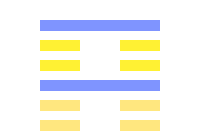
52.3.4.5.6 (52 > 45) - THE KĂN HEXAGRAM.
- 3. The third line, undivided, shows its subject keeping his loins at rest, and separating the ribs (from the body below). The situation is perilous, and the heart glows with suppressed excitement.
- 4. The fourth line, divided, shows its subject keeping his trunk at rest. There will be no error.
- 5. The fifth line, divided, shows its subject keeping his jawbones at rest, so that his words are (all) orderly. Occasion for repentance will disappear.
- 6. The sixth line, undivided, shows its subject devotedly maintaining his restfulness. There will be good fortune.
52.3.4.5.6 (52 > 45) - Stop
One withstands a lot of blows to make one's team win.
Bing DeepL Google Yandex52.3.4.5.6 (52 > 45) - Stop
One withstands a lot of blows to make one's team win.
Bing DeepL Google Yandex52.3.4.5.6 (52 > 45) - Kán, l’arrêt
Kán : ferme, tenir droit, bien réglé, arrêter, reposer
- 3. Se tenir ferme à sa place et le corps (litt. : les côtes) bien tenu, (c’est ainsi que l’on doit être).
- 4. Tenir le corps droit et ferme, c’est une bonne manière. [On doit tenir le corps entier tout droit.] (Répétition du § 3 pour en avoir six. Tenir le corps droit est un principe essentiel des rites chinois.)
-
5. Tenir ses mâchoires de sorte que les paroles sortent de la bouche avec ordre et mesure, cela exempte de repentir.
On sait ainsi conserver le milieu. -
6. Être tout appliqué à rester ferme dans le bien est une disposition très heureuse.
On peut ainsi être juste et droit jusqu’à la fin.
52.3.4.5.6 (52 > 45) - Cesser
On encaisse beaucoup de coups pour faire gagner son camp.
Bing DeepL Google Yandex52.3.4.5.6 (52 > 45) - Megállás
- 3. A legalkalmasabbat kéri ha mások nem válaszolnak.
- 4. Megáll, de mások folytatják.
- 5. Nem fejti ki kételyeit hogy ne okozzon nehézségeket.
- 6. Tanulmányozza környezete igényeit mielőtt foglalkozna azokkal.
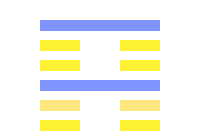
52.1.3.4.5.6 (52 > 17) - THE KĂN HEXAGRAM.
- 1. The first line, divided, shows its subject keep- ing his toes at rest. There will be no error; but it will be advantageous for him to be persistently firm and correct.
- 3. The third line, undivided, shows its subject keeping his loins at rest, and separating the ribs (from the body below). The situation is perilous, and the heart glows with suppressed excitement.
- 4. The fourth line, divided, shows its subject keeping his trunk at rest. There will be no error.
- 5. The fifth line, divided, shows its subject keeping his jawbones at rest, so that his words are (all) orderly. Occasion for repentance will disappear.
- 6. The sixth line, undivided, shows its subject devotedly maintaining his restfulness. There will be good fortune.
52.1.3.4.5.6 (52 > 17) - Stop
One compares oneself to others to avoid feeling sorry for oneself.
Bing DeepL Google Yandex52.1.3.4.5.6 (52 > 17) - Stop
One compares oneself to others to avoid feeling sorry for oneself.
Bing DeepL Google Yandex52.1.3.4.5.6 (52 > 17) - Kán, l’arrêt
Kán : ferme, tenir droit, bien réglé, arrêter, reposer
-
1. (On doit) tenir fermes ses pieds ; i. e. être toujours d’une ferme droiture.
Ne jamais perdre sa droiture. - 3. Se tenir ferme à sa place et le corps (litt. : les côtes) bien tenu, (c’est ainsi que l’on doit être).
- 4. Tenir le corps droit et ferme, c’est une bonne manière. [On doit tenir le corps entier tout droit.] (Répétition du § 3 pour en avoir six. Tenir le corps droit est un principe essentiel des rites chinois.)
-
5. Tenir ses mâchoires de sorte que les paroles sortent de la bouche avec ordre et mesure, cela exempte de repentir.
On sait ainsi conserver le milieu. -
6. Être tout appliqué à rester ferme dans le bien est une disposition très heureuse.
On peut ainsi être juste et droit jusqu’à la fin.
52.1.3.4.5.6 (52 > 17) - Cesser
On se compare aux autres pour éviter de s'apitoyer sur son sort.
Bing DeepL Google Yandex52.1.3.4.5.6 (52 > 17) - Megállás
- 1. Nem megy megnézni mit tesznek a többiek hogy kerülje a bajokat.
- 3. A legalkalmasabbat kéri ha mások nem válaszolnak.
- 4. Megáll, de mások folytatják.
- 5. Nem fejti ki kételyeit hogy ne okozzon nehézségeket.
- 6. Tanulmányozza környezete igényeit mielőtt foglalkozna azokkal.
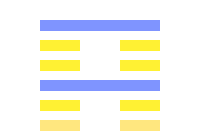
52.2.3.4.5.6 (52 > 47) - THE KĂN HEXAGRAM.
- 2. The second line, divided, shows its subject keeping the calves of his legs at rest. He cannot help (the subject of the line above) whom he follows, and is dissatisfied in his mind.
- 3. The third line, undivided, shows its subject keeping his loins at rest, and separating the ribs (from the body below). The situation is perilous, and the heart glows with suppressed excitement.
- 4. The fourth line, divided, shows its subject keeping his trunk at rest. There will be no error.
- 5. The fifth line, divided, shows its subject keeping his jawbones at rest, so that his words are (all) orderly. Occasion for repentance will disappear.
- 6. The sixth line, undivided, shows its subject devotedly maintaining his restfulness. There will be good fortune.
52.2.3.4.5.6 (52 > 47) - Stop
One takes upon oneself to trust those who have been disappointing before.
Bing DeepL Google Yandex52.2.3.4.5.6 (52 > 47) - Stop
One takes upon oneself to trust those who have been disappointing before.
Bing DeepL Google Yandex52.2.3.4.5.6 (52 > 47) - Kán, l’arrêt
Kán : ferme, tenir droit, bien réglé, arrêter, reposer
-
2. « Arrêter le mouvement des jambes ». (Ou les tenir droites et bien posées.) Si, devant s’arrêter, on ne peut aider celui qui marche devant soi, on doit en avoir du déplaisir.
On doit aider et se rendre au cri d’appel. - 3. Se tenir ferme à sa place et le corps (litt. : les côtes) bien tenu, (c’est ainsi que l’on doit être).
- 4. Tenir le corps droit et ferme, c’est une bonne manière. [On doit tenir le corps entier tout droit.] (Répétition du § 3 pour en avoir six. Tenir le corps droit est un principe essentiel des rites chinois.)
-
5. Tenir ses mâchoires de sorte que les paroles sortent de la bouche avec ordre et mesure, cela exempte de repentir.
On sait ainsi conserver le milieu. -
6. Être tout appliqué à rester ferme dans le bien est une disposition très heureuse.
On peut ainsi être juste et droit jusqu’à la fin.
52.2.3.4.5.6 (52 > 47) - Cesser
On prend sur soi de faire confiance à ceux qui ont été décevants auparavant.
Bing DeepL Google Yandex52.2.3.4.5.6 (52 > 47) - Megállás
- 2. Ha a másik többet akar, nem tarthatja vissza.
- 3. A legalkalmasabbat kéri ha mások nem válaszolnak.
- 4. Megáll, de mások folytatják.
- 5. Nem fejti ki kételyeit hogy ne okozzon nehézségeket.
- 6. Tanulmányozza környezete igényeit mielőtt foglalkozna azokkal.
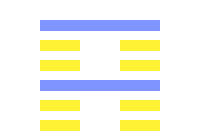
52.1.2.3.4.5.6 (52 > 58) - THE KĂN HEXAGRAM.
- 1. The first line, divided, shows its subject keep- ing his toes at rest. There will be no error; but it will be advantageous for him to be persistently firm and correct.
- 2. The second line, divided, shows its subject keeping the calves of his legs at rest. He cannot help (the subject of the line above) whom he follows, and is dissatisfied in his mind.
- 3. The third line, undivided, shows its subject keeping his loins at rest, and separating the ribs (from the body below). The situation is perilous, and the heart glows with suppressed excitement.
- 4. The fourth line, divided, shows its subject keeping his trunk at rest. There will be no error.
- 5. The fifth line, divided, shows its subject keeping his jawbones at rest, so that his words are (all) orderly. Occasion for repentance will disappear.
- 6. The sixth line, undivided, shows its subject devotedly maintaining his restfulness. There will be good fortune.
52.1.2.3.4.5.6 (52 > 58) - Stop
One would like to move faster but the others need to rest.
Bing DeepL Google Yandex52.1.2.3.4.5.6 (52 > 58) - Stop
One would like to move faster but the others need to rest.
Bing DeepL Google Yandex52.1.2.3.4.5.6 (52 > 58) - Kán, l’arrêt
Kán : ferme, tenir droit, bien réglé, arrêter, reposer
-
1. (On doit) tenir fermes ses pieds ; i. e. être toujours d’une ferme droiture.
Ne jamais perdre sa droiture. -
2. « Arrêter le mouvement des jambes ». (Ou les tenir droites et bien posées.) Si, devant s’arrêter, on ne peut aider celui qui marche devant soi, on doit en avoir du déplaisir.
On doit aider et se rendre au cri d’appel. - 3. Se tenir ferme à sa place et le corps (litt. : les côtes) bien tenu, (c’est ainsi que l’on doit être).
- 4. Tenir le corps droit et ferme, c’est une bonne manière. [On doit tenir le corps entier tout droit.] (Répétition du § 3 pour en avoir six. Tenir le corps droit est un principe essentiel des rites chinois.)
-
5. Tenir ses mâchoires de sorte que les paroles sortent de la bouche avec ordre et mesure, cela exempte de repentir.
On sait ainsi conserver le milieu. -
6. Être tout appliqué à rester ferme dans le bien est une disposition très heureuse.
On peut ainsi être juste et droit jusqu’à la fin.
52.1.2.3.4.5.6 (52 > 58) - Cesser
On voudrait avancer plus vite mais les autres ont besoin de se reposer.
Bing DeepL Google Yandex52.1.2.3.4.5.6 (52 > 58) - Megállás
- 1. Nem megy megnézni mit tesznek a többiek hogy kerülje a bajokat.
- 2. Ha a másik többet akar, nem tarthatja vissza.
- 3. A legalkalmasabbat kéri ha mások nem válaszolnak.
- 4. Megáll, de mások folytatják.
- 5. Nem fejti ki kételyeit hogy ne okozzon nehézségeket.
- 6. Tanulmányozza környezete igényeit mielőtt foglalkozna azokkal.

